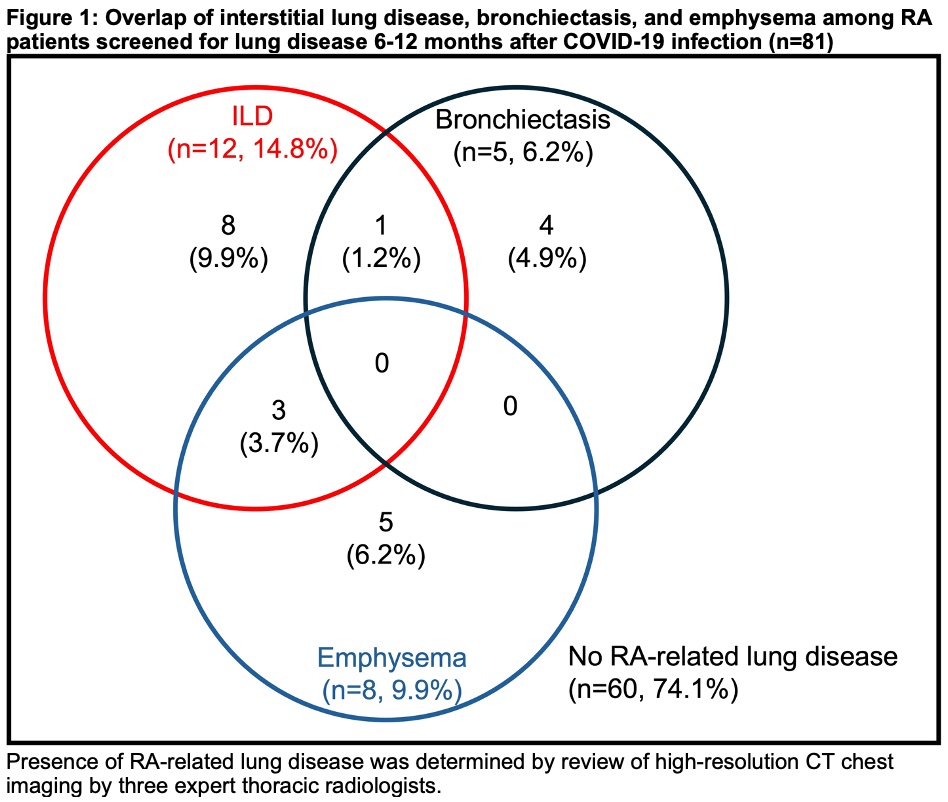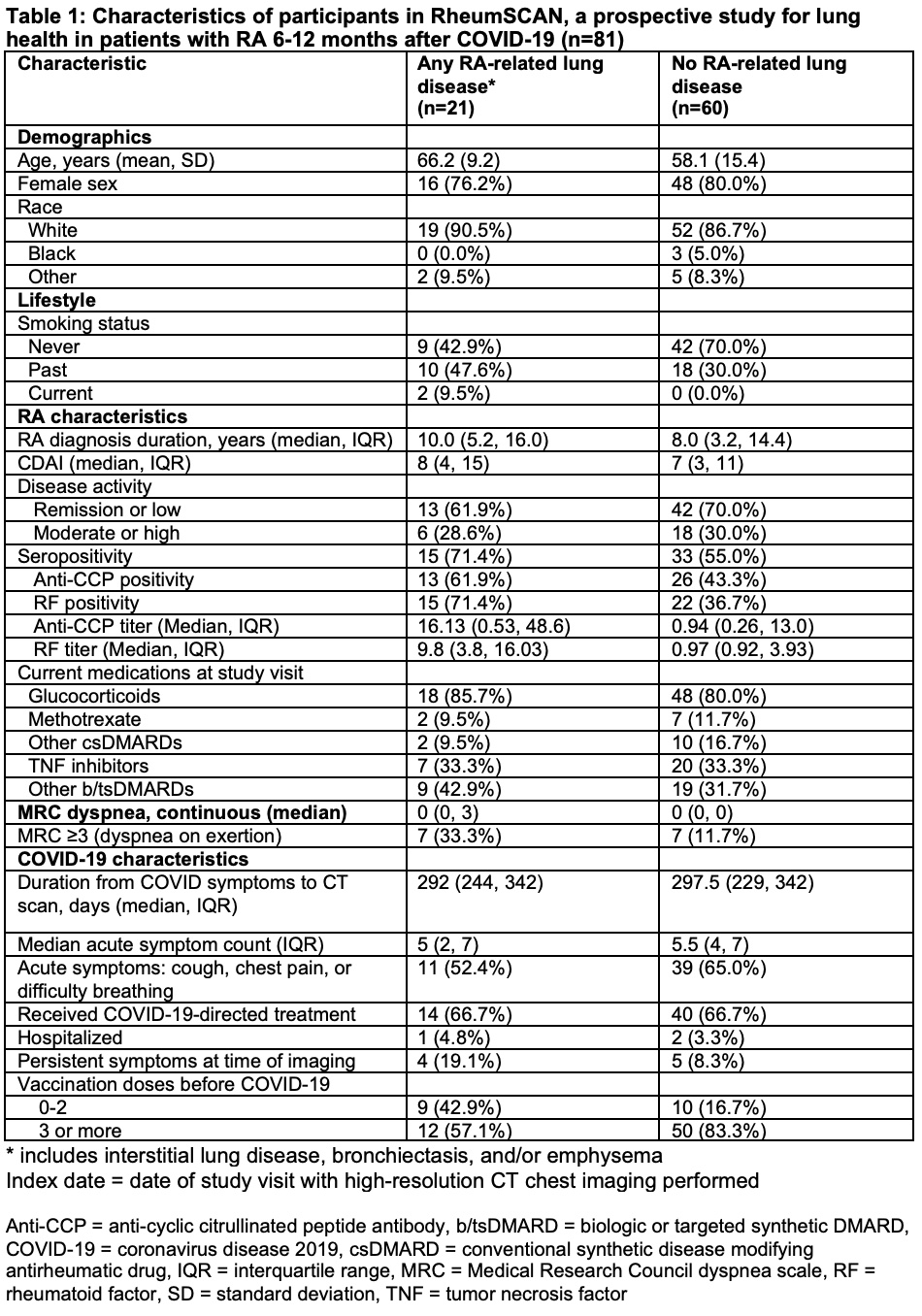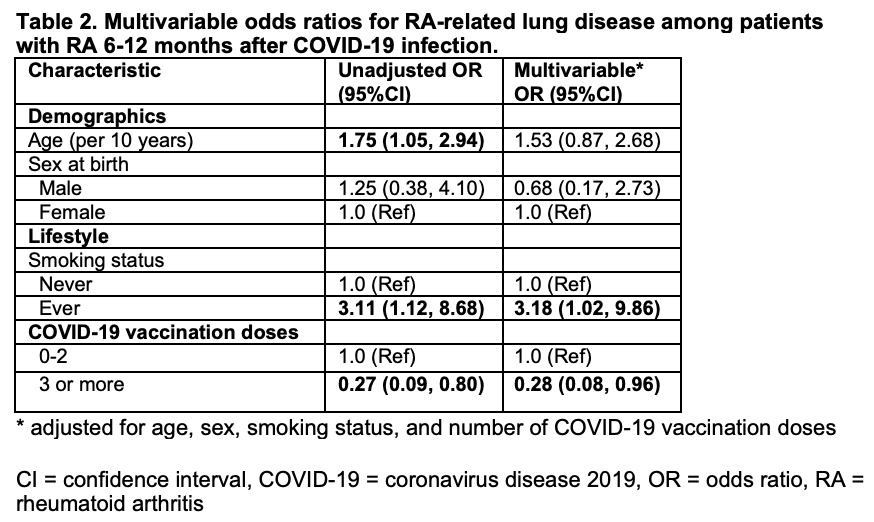Session Information
Session Type: Abstract Session
Session Time: 3:00PM-4:30PM
Background/Purpose: RA is associated with several forms of parenchymal lung disease, including interstitial lung disease (ILD), bronchiectasis, and emphysema. Acute COVID-19 and other respiratory viruses may be a trigger for long-term pulmonary sequelae in some, and patients with RA may be susceptible to pulmonary damage due to propensity for lung inflammation and fibrosis. The relationship between RA disease and treatment-related factors, respiratory viral infection, and RA-related lung disease remains unclear. Therefore, we performed a prospective study investigating the pulmonary health of patients with RA after COVID-19.
Methods: The RA and Sequelae of COVID-19 Affecting the Lungs study (RheumSCAN) enrolled patients with RA with prior COVID-19 at a large academic healthcare system (2022-2024). All participants enrolled 6-12 months after COVID-19 and completed surveys, high-resolution computed tomography (HRCT) chest imaging, pulmonary function tests, and had physical examination to collect RA disease activity. All HRCT scans were reviewed by three expert thoracic radiologists and scored for interstitial lung abnormalities, bronchiectasis, or emphysema. Data on COVID-19 severity, hospitalization, vaccination status, and symptom duration were collected by review of electronic health records and surveys. We compared RA patients with and without RA-related lung disease at the study visit using descriptive statistics and multivariable logistic regression.
Results: To date, 81 patients with RA (median RA duration 8.4 years, 79% female, 67% seropositive) completed the RheumSCAN study visit. The median duration from COVID symptom onset to study enrollment was 295 days. A total of 21 patients (26%) had evidence of ILD, bronchiectasis, and/or emphysema on chest HRCT imaging (Figure 1). ILD was the most common RA-related lung disease, occurring in 15%. Participants with RA-related lung diseases were older (mean 66.2 vs. 58.1 years, p=0.03), more likely to be ever smokers (57% vs. 30%, p=0.03), and more likely to be rheumatoid factor-positive (71.4% vs. 36.7%, p=0.007) (Table 1). There were no associations between RA-related lung disease, DMARD use, or RA disease activity measured by CDAI. Participants receiving 3 or more COVID-19 vaccines were less likely to have RA-related lung disease compared to those who received 0-2 COVID vaccines prior to infection. In multivariable models adjusted for age, sex, and smoking status (Table 2), receiving 3 or more COVID-19 vaccines was associated with significantly lower odds of RA-related lung disease after COVID-19 (OR 0.28 95%CI 0.08-0.96, compared to those receiving 2 or fewer).
Conclusion: In this prospective study evaluating lung health among patients with RA within 1 year of COVID-19 infection, the prevalence of ILD, bronchiectasis, or emphysema was 26%. Presence of RA-related lung disease after COVID-19 infection was associated with ever smoking status and having received two or fewer COVID-19 vaccines. These results further emphasize the importance of COVID-19 vaccination in the RA population and suggest that viral infection may trigger the development of lung disease in RA.
To cite this abstract in AMA style:
McDermott G, Gill R, Byrne S, Gagne S, Kowalski E, Wang X, Qian G, Bade K, Mueller K, Saavedra A, Vanni K, Bolden C, Patel N, Guzzo K, Bolster M, Srivatsan S, Juge P, J Doyle T, Wallace Z, Sparks J. Vaccination Is Associated with Lower Risk of Parenchymal Lung Disease in Patients with Rheumatoid Arthritis After COVID-19: Results from a Prospective Study [abstract]. Arthritis Rheumatol. 2024; 76 (suppl 9). https://acrabstracts.org/abstract/vaccination-is-associated-with-lower-risk-of-parenchymal-lung-disease-in-patients-with-rheumatoid-arthritis-after-covid-19-results-from-a-prospective-study/. Accessed .« Back to ACR Convergence 2024
ACR Meeting Abstracts - https://acrabstracts.org/abstract/vaccination-is-associated-with-lower-risk-of-parenchymal-lung-disease-in-patients-with-rheumatoid-arthritis-after-covid-19-results-from-a-prospective-study/



